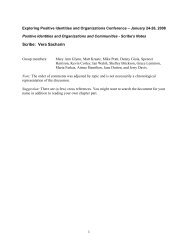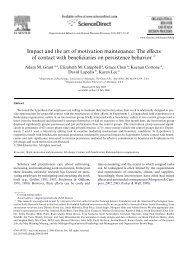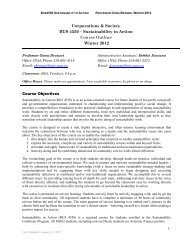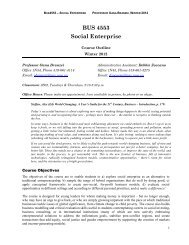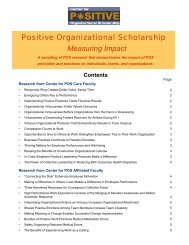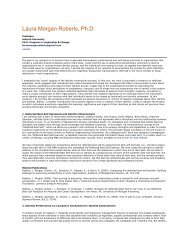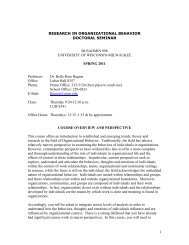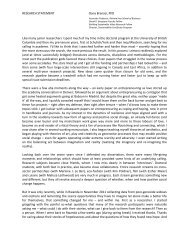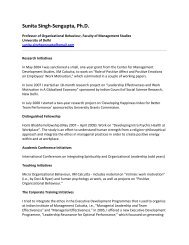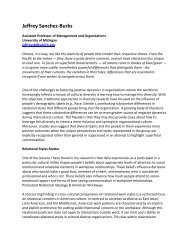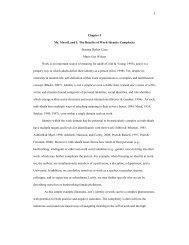Amy Wrzesniewski - Center for Positive Organizational Scholarship
Amy Wrzesniewski - Center for Positive Organizational Scholarship
Amy Wrzesniewski - Center for Positive Organizational Scholarship
Create successful ePaper yourself
Turn your PDF publications into a flip-book with our unique Google optimized e-Paper software.
<strong>Amy</strong> <strong>Wrzesniewski</strong><br />
Associate Professor of <strong>Organizational</strong> Behavior<br />
Yale School of Management<br />
amy.wrzesniewski@yale.edu<br />
Website<br />
Focus<br />
The focus of my research is on how individuals derive meaning from their jobs within<br />
challenging work and life contexts. My work seeks to explain the psychological and social<br />
processes through which work meanings develop. As well, I study the implications of these<br />
work meanings <strong>for</strong> individuals and organizations. Specifically, I study how individuals’<br />
orientations toward work influence organizational identification, job crafting, motivation,<br />
behaviors on the job, career trajectories between organizations, the meaning of work, and<br />
feelings and thoughts about work.<br />
My research has developed from studying work orientations (i.e., work as a job, a career, or a<br />
calling) as an individual differences phenomenon to studying the dynamic interplay between<br />
the work context and work orientation. The process that unfolds when an individual’s work<br />
orientation enters an organizational context affects the way the individual defines the job,<br />
engages with others in the organization, and enacts an organizational role.<br />
As well, the organizational context may rein<strong>for</strong>ce, weaken, or have no effect on work<br />
orientation. My interest in the impact of organizational practices and work arrangements on<br />
individual experiences of work reflects a broadening of the lens I bring to the study of the<br />
meaning of work. I have chosen to study work meanings through a lens of problematic work<br />
contexts. This approach allows me to isolate particularly salient features of the organizational<br />
context in order to understand how they affect the expression of work orientation. The<br />
contexts in which I study the meaning of work include “dirty work” jobs (jobs that are judged by<br />
self or others to be odious or onerous), constrained occupational choices (in which individuals<br />
are not able to enter their desired occupation), periods of unemployment, virtual work, and<br />
organizations with conflicted identities. These contexts allow me to both test and build upon<br />
theories of the meaning of work, motivation and job design.<br />
Specific Research<br />
My general research frame draws from the influential work of Bellah and colleagues (1985) and<br />
their assertion that individuals experience work in one of three distinct ways: as a ‘job,’ (in<br />
which the individual is primarily concerned with the financial rewards of work); a ‘career,’ (in
which the individual is focused on advancing within the occupational structure); or a ‘calling,’<br />
(in which the individual works not <strong>for</strong> financial gain or career advancement, but instead <strong>for</strong> the<br />
sense of fulfillment that the work brings). I have used this core insight to develop and test<br />
theory about how work orientations affect individual behavior through their effects on goal<br />
structures that individuals bring to their work. Currently, I am studying how both the individual<br />
actions of employees and the social environment at work shape work orientations and the<br />
broader experience of the job (<strong>Wrzesniewski</strong>, Dutton, & Debebe, 2003).<br />
My work addresses the possibility of finding positive meaning in work through a variety of<br />
paths: the work itself, its perceived contribution to the greater good, interactions and<br />
relationships with others on the job, and the ability to challenge oneself, to name a few. The<br />
roles that individuals and organizations can play in pursuit of this meaning stands at the heart<br />
of my focus in this domain.<br />
Related References<br />
Bellah, R. N., Madsen, R., Sullivan, W. M., Swidler, A., & Tipton, S. M. 1985. Habits of the heart:<br />
Individualism and commitment in American life. New York: Harper & Row.<br />
Gandal, N., Roccas, S., Sagiv, L. & <strong>Wrzesniewski</strong>, A. (2005). Personal value priorities of<br />
economists. Human Relations, 58, 1227-1252.<br />
<strong>Wrzesniewski</strong>, A., Dutton, J. E., & Debebe, G. (2003). Interpersonal sensemaking and the<br />
meaning of work. Research in <strong>Organizational</strong> Behavior, 25, 93-135.<br />
<strong>Wrzesniewski</strong>, A. (2002). “It’s not just a job”: Shifting meanings of work in the wake of 9/11.<br />
Journal of Management Inquiry, 11(2), 230-234.<br />
<strong>Wrzesniewski</strong>, A., & Dutton, J. E. (2001). Crafting a job: Revisioning employees as active crafters<br />
of their work. Academy of Management Review, 26(2), 179-201. Reprinted in C. L. Cooper & W.<br />
H. Starbuck (Eds.), Work and Workers: A Three-Volume Set. Thousand Oaks: Sage Publications,<br />
2005.<br />
<strong>Wrzesniewski</strong>, A., McCauley, C. R., Rozin, P., & Schwartz, B. (1997). Jobs, careers, and callings:<br />
People’s relations to their work. Journal of Research in Personality, 31, 21-33.<br />
<strong>Wrzesniewski</strong>, A. & Tosti, J. (2005). Career as a calling. In J. H. Greenhaus & G. A. Callanan<br />
(Eds.), Encyclopedia of Career Development. Thousand Oaks: Sage Publications.<br />
<strong>Wrzesniewski</strong>, A. (2003). Finding positive meaning in work. In K. S. Cameron, J. E. Dutton, & R. E.<br />
Quinn (Eds.), <strong>Positive</strong> <strong>Organizational</strong> <strong>Scholarship</strong>. San Francisco: Berrett-Koehler.
<strong>Wrzesniewski</strong>, A., Rozin, P., & Bennett, G. (2002). Working, playing, and eating: Making the<br />
most of most moments. In C. L. M. Keyes & J. Haidt (Eds.), Flourishing: The <strong>Positive</strong> Person and<br />
the Good Life. Washington, DC: American Psychological Association.



